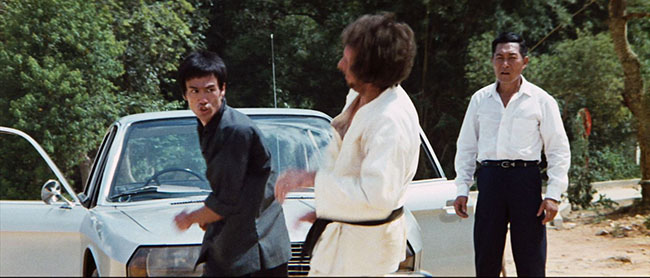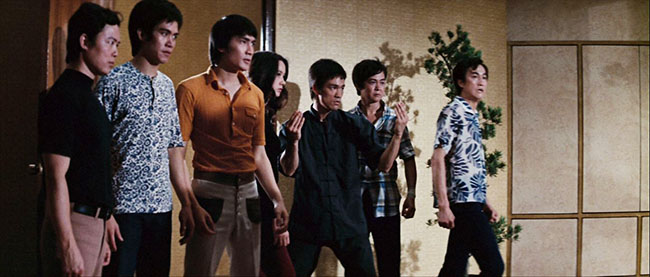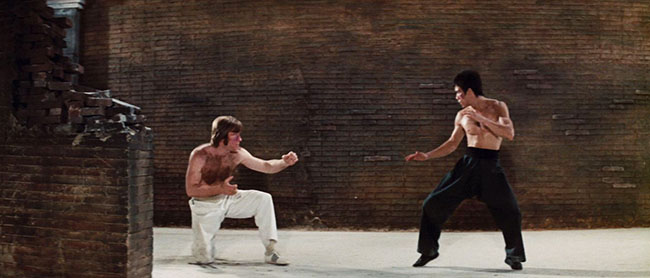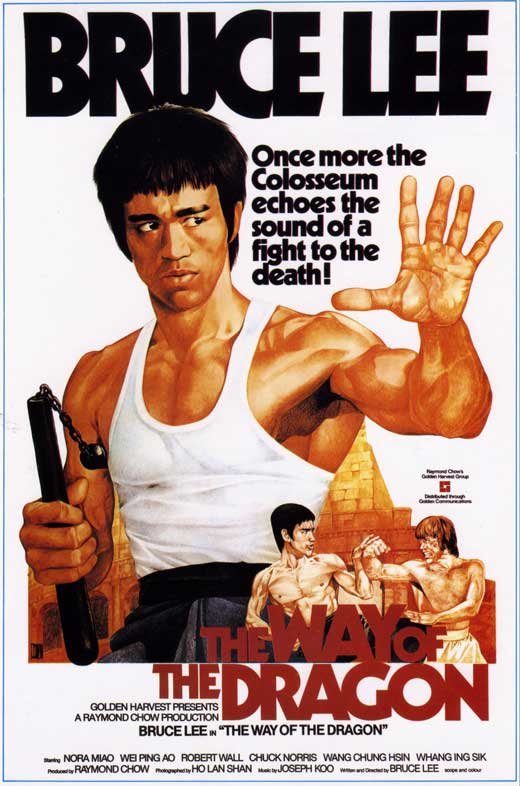
In May, Shout! Factory continues their line of 4K restorations of Bruce Lee classics with Return of the Dragon, whose original title is The Way of the Dragon (1972). (These Blu-Rays are great, but it would’ve been really nice – and a lot less confusing – if the true titles had been used.) Shout will also be releasing Game of Death (1978), the posthumous Lee film with just 11 minutes of footage of the actor. Enter the Dragon (1973) is Lee’s last proper film, which makes The Way of the Dragon all the more valuable: his penultimate feature, with Lee himself in the director’s chair. It could be argued that this is the film which best portrays the sort of film Lee wanted to make, his idea of the perfect star vehicle. (His previous films The Big Boss and Fist of Fury were directed by Lo Wei.) It’s often labeled as a comedy, which is misleading, and not just because the attempts at humor are seldom funny. This is a martial arts film, and the showcase is Lee’s fighting techniques, in collaboration with co-“action instructor” Unicorn Chan, Lee’s colleague who also appears in the film. Even the crudely animated titles, which continue the energetic, Morricone/Leone style of the previous Lee opening credits, come off this round more like a pasted-up handbill outside the local karate school. Come and see “Chuck Norris, 7 Times U.S. & World Karate Champion!” Plus “Robert Wall, World Professional Karate Champion 1970!” And guys, stick around for “Italian Beauty, Malisa Longo!”

Bruce Lee (third from the right) leads his crew in battle.
By now, the plot should sound pretty familiar. Lee plays Tang Lung, who flies into Rome from Hong Kong to help pretty entrepreneur Chen Ching-hua (Nora Miao, his co-star of The Big Boss and Fist of Fury), whose restaurant, and the land it occupies, is coveted by a crime syndicate. They’ve been pressuring her into selling and sending thugs to bully and threaten the staff (which includes Unicorn Chan). The staff are trained in karate, but Tang Lung quickly begins schooling them in his own method of Chinese boxing. The leader of the gangsters (Jon Benn) and his flamboyant second-in-command, Ho (Paul Wei, Fist of Fury), now face a more challenging resistance, in particular from Tang Lung, who uses hand-carved throwing darts on his enemies, when he’s not relentlessly punching and kicking them in the crotch. (Crotches see a lot of abuse in this film.) When Tang Lung refuses to accept a plane ticket back to Hong Kong, the syndicate hires a hitman with a rifle, then Japanese karate experts (Robert Wall and Hwang In-Shik) and an American martial artist, Colt (Chuck Norris, in his debut). As with his other films, Lee only gets more pissed off, and more savage in his fighting, as the story progresses, leading to a climactic battle with Norris set in the Colosseum. Before the fight, the two take a moment to warm up, and Lee shows us that even his muscles have muscles; when he flexes his back into strange protruding shapes, it looks for a fleeting second like he might transform into the American Werewolf in London. The fight itself has rightly gone down as one of Lee’s greatest on screen, and it demonstrates the strength of having him direct. It’s easy to follow the different stages of the battle: first Lee getting overpowered by Norris, then using his boxing style to confuse and strike at his opponent; Norris, desperate, clumsily attempts to imitate Lee’s dancing body, but Lee pummels him easily, breaking bones before putting the hobbling Texas Ranger out of his misery. Here we see Lee’s strength as a storyteller – not through a script, but through fight choreography. The drama transitions naturally into something more tragic; Lee even returns to Norris’s body to cover him, honoring his worthy opponent. Although ostensibly set in the Colosseum, the fight is clearly in a studio, yet impressive location footage shows Norris stalking Lee through the labyrinthine open-air passages of the Colosseum grounds.

Colt (Chuck Norris) vs. Tang Lung (Lee).
Elsewhere, Lee’s weaknesses as a director are more evident. The film opens with Tang Lung as a fish out of water, with no English skills (a nice touch, actually), awkwardly ordering and eating everything on the menu, then taking ill-timed bathroom breaks while introducing himself to Chen. When told that he needs to be more friendly with the locals, he acquiesces by interrupting their conversation to run off with a local beauty who offers to take him back to her place. Once he’s there, however, he flees at the first sight of her bare breasts; it’s both inexplicable and weirdly charming that our hero is apparently a virgin, chaste to the point of being afraid of women. (By contrast, in The Big Boss he was all too eager to jump into bed with the local prostitutes. A scene deleted from that film, but which features in the trailer, has Lee paying for sex to warm up for the final battle.) It takes a while to get to the first action scene, and everything leading up to it is handled crudely and shot in the most rudimentary fashion. The plotting also feels redundant once the fights begin; a last-minute twist involving the character of Uncle Wang (Chung-Hsin Huang) feels lazily tacked-on. By contrast, Fist of Fury felt urgent and lushly cinematic in every moment. Still, even second-rate Lee is fun to watch. He’s an electric performer even in the non-action scenes, and the unblinking takes and fast-striking choreography demonstrate what’s lacking in so many modern action films and TV shows (I’m looking at you, Iron Fist). The romance may be absent, and the comedy may be lacking, but this is pure athleticism as film. Next would come a more varied and entertaining movie, his most iconic: Enter the Dragon, and a level of superstardom that, sadly, Lee would not live to see.










